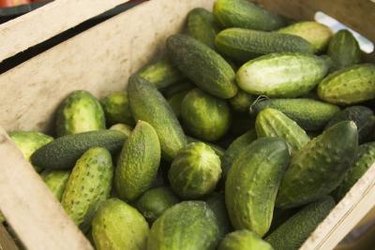
A bountiful summertime vegetable, the cucumber adds crunch and coolness to green salads, pasta salads and tuna sandwiches. Colorful cukes even offer a non-starchy chip alternative on your chips and dip platter. But some people experience side effects after eating cucumbers. Whether it's itchy skin or embarrassing belching, pinning down what's causing these unwelcome reactions will tell you whether you need to give up crunchy cucumbers, or simply look for new ways to enjoy them.
Gassiness
Video of the Day
Traditional cucumbers contain a compound called cucurbitacin, which provokes indigestion in some people. Look for "burpless" varieties in the supermarket. If you grow your own, seek out seed catalogues offering burpless cucumber seeds. Breeders removed cucurbitacin from some varieties of cucumber, resulting in less gas and a less bitter taste. If your can't find this variety of cucumber, or indigestion continues to be a problem, Drugs.com recommends vegetable or vegetable dishes with a "no gas" reputation, including winter squash, summer squash, carrots and vegetable soup. Other veggies that provoke gassiness in some people include cabbage, broccoli, cauliflower, radishes, green peppers, corn and onions.
Video of the Day
Allergies
Swelling or hives around your mouth, throat and tongue commonly occur with oral allergy syndrome. You may also experience itchy skin. If you have an allergy to ragweed, cucumbers may also cause allergic reactions, according to American Academy of Allergy Asthma & Immunology. A phenomenon known as cross-reactivity explains why some people with ragweed pollen also experience allergic symptoms after eating certain foods. Cucumbers fall into the ragweed cross-reactivity group, as do melons, sunflower seeds, chamomile tea and bananas. Cooking the foods usually removes the threat of allergic reactions. Since cucumbers are traditionally served fresh, however, you may find it easier to find another crisp vegetable for your salad, such as raw zucchini.
The Wax Issue
Some people wonder if the waxy finish found on supermarket cucumbers contains harmful chemicals. The artificial wax coatings replace the natural waxiness on certain vegetable skins, including cucumbers, that are often lost in the handling of field-to-market produce. The system helps cucumbers retain moisture and resist mold growth or bacterial disease in the shipping process. Wax coatings are food-grade and considered safe, according to the U.S. Food and Drug Administration. The waxes may be shellac, vegetable, beeswax or petroleum-based. If you have sensitivity to any of those products, cucumber skins could theoretically cause side effects. Scrub or peel the cucumbers before eating, or buy non-waxed cucumbers from farm stands or organic produce dealers.
Benefits
The high water content and naturally chilled internal temperatures of cucumbers make them a classic summer food. Cucumbers also contribute vitamins A and C. Because cucumbers are low in calories and carbohydrates and contain no fat or sodium, they add healthy bulk to salads or sandwich fillings. People on low-carb diets also appreciate cucumbers ability to stand in for starchy chips, crackers and breadsticks. Cut cucumbers into rounds to hold creamy cheese spreads and into spears for inclusion on a crudités platter.
Is this an emergency? If you are experiencing serious medical symptoms, please see the National Library of Medicine’s list of signs you need emergency medical attention or call 911.